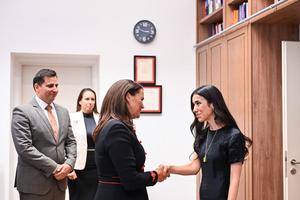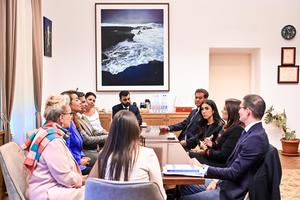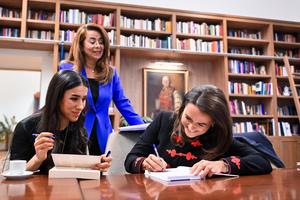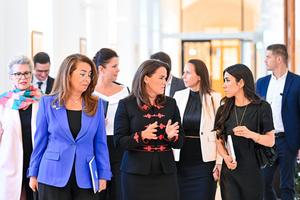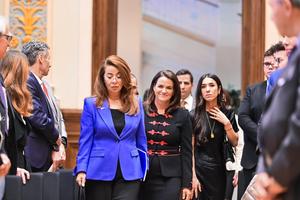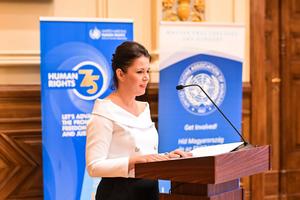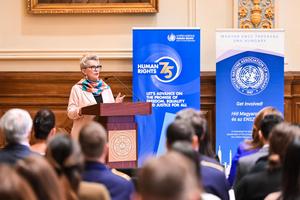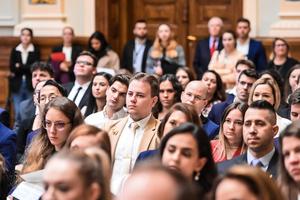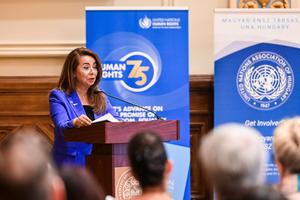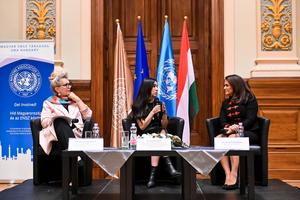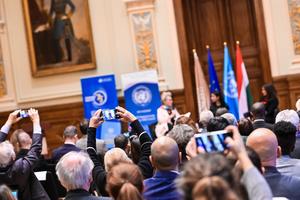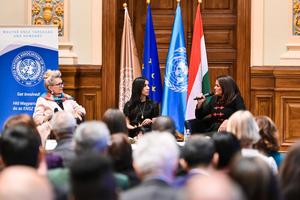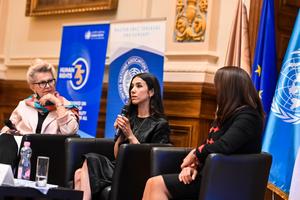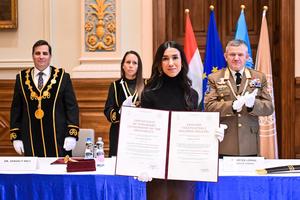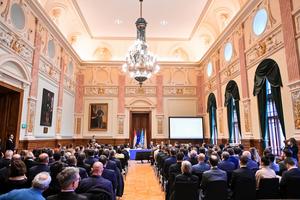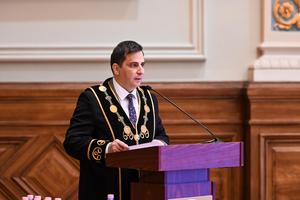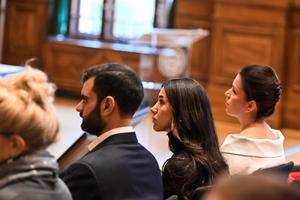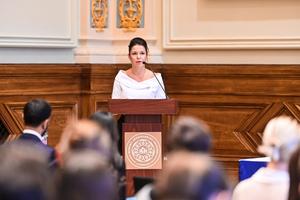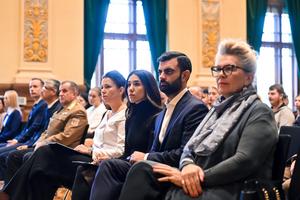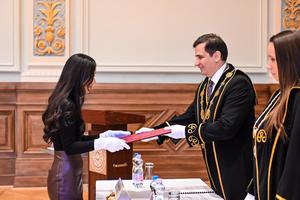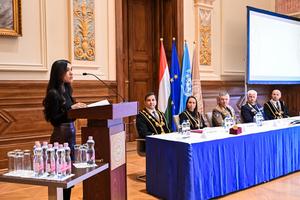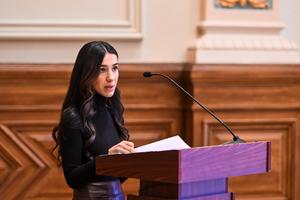Ludovika University of Public Service (LUPS) and the Hungarian UN Association organized an international roundtable discussion on the 75th anniversary of the Universal Declaration of Human Rights on November 21. The event was attended by Katalin Novák, the President of the Republic, Nadia Murad, a Nobel Peace Prize-winning human rights activist, Ghada Waly, the Director-General of the UN Office at Vienna, and Katalin Bogyay, the President of the Hungarian UN Association. The event was opened by Boglárka Koller, the vice-rector for international affairs of LUPS.
During the morning session, Nadia Murad was honored as an honorary citizen of Ludovika University of Public Service. In his welcoming speech, Gergely Deli, the rector, expressed that "Nadia Murad is not only a courageous and determined activist but also a person who knew how to remain strong in the midst of pain and suffering." He emphasized that Nadia Murad's example shows that we must continue to fight for justice and human rights. The rector of our university highlighted that Nadia Murad's perseverance is an example for all of us, emphasizing our role and responsibility in the ongoing fight for rights.
Boglárka Koller, the vice-rector for international affairs of LUPS, reminded in her speech that the Nobel Peace Prize-winning activist was only 21 years old when, in 2014, ISIS militants attacked her country and kidnapped her from the autonomous region of Iraqi Kurdistan. The young woman, who was raped and successfully escaped from captivity, became a spokesperson for the victims of human trafficking, the Yazidis, and women subjected to abuse and human rights violations, sharing her personal story and experiences with the world.
Nadia Murad, who received the Nobel Peace Prize in 2018 for her fight against the use of sexual violence as a weapon of war, stated in her speech that being in Budapest and receiving the honorary title of the university was beyond her imagination. She emphasized that the past nine years of her life have been about standing up for justice and peace.
"I want to encourage future leaders to fight every day against inequalities and crimes against people," Nadia Murad emphasized. Regarding her homeland, Iraq, she stated that it is an unstable country with weak state structures that have been attacked many times. She added that we must believe that humanity can stop ISIS and advocated for the disclosure of crimes committed by the terrorist organization and assistance to the victims.
"The fact that there is so much interest in today's discussion shows that human rights are not theoretical, beautifully written words on paper, but our continuous struggle for everyday life," emphasized Katalin Novák, the President of the Republic, in the afternoon roundtable discussion. She highlighted that no human right should ever be taken for granted because living in welfare societies can lead us to think that fundamental rights are given to all of us, and we don't need to strive for them every day. She stated that if theories are not put into practice, they are worthless. The President emphasized that in terms of legal protection, every country must also consider its own situation within its borders and ask whether the most basic human rights are truly fulfilled for all citizens.
In her conversation with Katalin Novák, Nadia Murad spoke about the need for people to decide what kind of world they want to live in when faced with violence and human rights violations. She emphasized the importance of helping oppressed minorities protect their language, culture, and human dignity. She mentioned that, alongside her studies at Washington University, she regularly returns to her homeland, working with her colleagues to restore the everyday life of the Yazidi minority and assert their citizenship rights. During the conversation, the activist highlighted that she only learned about the Universal Declaration of Human Rights in 2015, after losing her family and friends. She expressed gratitude for finally becoming aware of this document when she read its articles.
Katalin Bogyay, the President of the Hungarian UN Association, stated in her speech that the Universal Declaration of Human Rights, issued 75 years ago, serves as a measure for every nation. She emphasized that the document articulates fundamental human rights concerning universal human protection for the first time. According to Bogyay Katalin, the Universal Declaration of Human Rights is widely recognized and has encouraged the adoption of numerous human rights treaties globally and digitally.
Ghada Waly, the Director-General of the UN Office at Vienna, expressed in her speech that although significant progress has been made worldwide thanks to the Universal Declaration of Human Rights adopted in Paris in 1948 and translated into over five hundred languages, the exercise of basic rights continues to face obstacles in many parts of the world. She emphasized that 60% of the victims of human trafficking violating basic human rights are women and girls, most of whom are victims of sexual violence or exploitation.
Text: Éva Harangozó
Photo: Dénes Szilágyi
